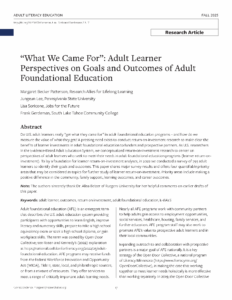In a national survey of 793 adult learners participating in Adult Foundational Education (AFE) programs across the United States, researchers set out with a goal to understand why individuals enroll in adult education programs, what outcomes they experience, and how these findings can inform a future learner-centered return on investment (ROI) study.
 Traditionally, ROI research in adult education has emphasized economic outcomes, such as employment and earnings. However, Evidence-Based Adult Education System (E-BAES) researchers sought to redefine ROI by centering it on the experiences and priorities of the adult learners—laying the groundwork for a broader, more accurate picture of the “returns” adults find meaningful. Their findings are published in our most recent issue of the Adult Literacy and Education research journal and outlined here.
Traditionally, ROI research in adult education has emphasized economic outcomes, such as employment and earnings. However, Evidence-Based Adult Education System (E-BAES) researchers sought to redefine ROI by centering it on the experiences and priorities of the adult learners—laying the groundwork for a broader, more accurate picture of the “returns” adults find meaningful. Their findings are published in our most recent issue of the Adult Literacy and Education research journal and outlined here.
Key Survey Findings
1. Adult learners enroll in programs with diverse, multi-layered goals. Learners indicated they have many reasons for participation—showing that their motivations extend beyond employment alone. The most common goals included:
- Strengthening reading, writing, or math skills (51.7%)
- Gaining confidence (48.3%)
- Gaining skills to keep a current job (48.1%)
- Making life more satisfying (47.9%)
- Supporting their children’s learning (46.7%)
2. Learners reported many positive outcomes—both expected and unexpected. The most common outcomes included:
- Performing everyday tasks more easily (44.6%)
- Improved English skills (43.0%)
- More satisfied in life (42.5%)
- Gaining confidence (42.1%)
- Earning a high school credential (39.0%)
- Making a positive difference in the community (39.0%)
However, only 37.3% reported strengthening foundational skills as an outcome, despite it being the most common goal, at 51.7%. This gap signals unmet learner needs in core literacy and numeracy development.
3. Workforce-related goals showed the largest gaps. Despite 48.1% of learners saying they wanted to learn skills to keep their job, only 30.3% said they achieved this goal. Similar gaps appeared across all work-related goals, pointing to a need for stronger workforce pathways within AFE programs.
4. Learners can be grouped into five distinct profiles. Researchers identified five types of learners based on goal-setting and outcomes:
- High Achievers
- Ambitious Learners (high goals, low outcomes)
- Quiet Success (low goals, high outcomes)
- Steady Achievers
- Low-Engaging Learners
Because these classifications are so diverse, it becomes a challenge to measure ROI in a standardized way.
Further Study Needed
Next, the authors identified four key areas that can be measured and should guide a future learner-focused ROI study:
1. Making a positive difference in the community. Adult learners consistently ranked civic participation—expressing opinions, staying informed, and contributing positively to their community—as important. Further study could clarify how AFE participation strengthens civic engagement and community impact.
2. Family support. Adults frequently cited helping their children learn and keeping their families healthy and safe as major goals and outcomes. Measuring family-level effects could show how adult education strengthens intergenerational learning and mobility.
3. Learning outcomes. While English language acquisition, foundational skills (reading/writing/math), and high school credential attainment were common goals, the outcomes did not always match learners’ expectations—making them critical to study more deeply.
4. Career outcomes. Learners are seeking improved workplace skills to pursue new career goals. Gaps between goals and outcomes suggest the need to understand what supports or barriers affect career advancement.
The authors emphasize that there are multiple reasons why additional research is necessary. First, traditional ROI models overlook what adults actually value—confidence, family safety, and community contributions, for example. Also, more research could focus on the significant gaps between goals and outcomes that were seen in basic skill acquisition and career preparation, so programs can better align with learner expectations.
Taking steps to improve learner return on investment at the program level would provide funders and policymakers with clear evidence that learners enrolled in adult education programs are achieving goals they set out to achieve. In turn, this would lead to increased funding and support, the authors suggest.